connectionMgr/inc/editScreenDialup.h File Reference
connectionMgr - "Dialup" screen More...
#include <gtk/gtk.h>
#include <gdk/gdkkeysyms.h>
#include <glib.h>
#include <liberregxml/erregapi.h>

Go to the source code of this file.
Functions | |
| GtkWidget * | edit_dialup_create (void) |
| void | edit_dialup_enable_save_button (gboolean enable) |
| void | edit_dialup_set_text (void) |
| void | edit_dialup_set_network_settings (const regNetworkProfile_t *settings) |
| void | edit_dialup_get_network_settings (regNetworkProfile_t *settings) |
| gboolean | edit_dialup_check_network_settings (void) |
| void | edit_dialup_restore_network_settings (void) |
| void | edit_dialup_set_profilename (const char *profilename) |
| const char * | edit_dialup_get_profilename (void) |
| gboolean | on_edit_dialup_keypress (GdkEventKey *event) |
Detailed Description
connectionMgr - "Dialup" screenCopyright (C) 2007 iRex Technologies BV.
Definition in file editScreenDialup.h.
Function Documentation
| gboolean edit_dialup_check_network_settings | ( | void | ) |
Definition at line 681 of file editScreenDialup.c.
00682 { 00683 dialupStatus_t status; 00684 gboolean valid = TRUE; 00685 00686 CN_LOGPRINTF("entry"); 00687 00688 status = edit_dialup_detect_status(); 00689 if ((status != inputUser_e) 00690 && (status != inputPassword_e) 00691 && (status != undefStatus_e)) 00692 { 00693 valid = FALSE; 00694 } 00695 00696 CN_LOGPRINTF("return valid=%d", valid); 00697 return valid; 00698 }

| GtkWidget* edit_dialup_create | ( | void | ) |
Definition at line 120 of file editScreenDialup.c.
00121 { 00122 GtkWidget *item = NULL; 00123 GtkWidget *vbox = NULL; 00124 GtkWidget *settings = NULL; 00125 bkWdtLabelEntry *profilename = NULL; 00126 bkWdtLabelButton *buttons = NULL; 00127 GtkWidget *info = NULL; 00128 GtkWidget *widget = NULL; 00129 00130 CN_LOGPRINTF("entry"); 00131 00132 // item 00133 item = gtk_settingitem_new(""); 00134 00135 // vbox 00136 vbox = gtk_vbox_new(FALSE, VBOX_SPACING); 00137 gtk_settingitem_add_details(GTK_SETTINGITEM(item), vbox); 00138 00139 // settings 00140 settings = create_settings(); 00141 gtk_box_pack_start(GTK_BOX(vbox), settings, FALSE, FALSE, 0); 00142 00143 // profilename 00144 profilename = bk_wdt_label_entry_new(string_e); 00145 gtk_box_pack_start(GTK_BOX(vbox), profilename->background, 00146 FALSE, FALSE, 0); 00147 00148 // buttons 00149 buttons = bk_wdt_label_button_new(3, FALSE, 0, 1); 00150 gtk_box_pack_start(GTK_BOX(vbox), buttons->background, FALSE, FALSE, 0); 00151 00152 // info 00153 info = gtk_infoitem_new(FALSE); 00154 gtk_box_pack_start(GTK_BOX(vbox), info, FALSE, FALSE, 0); 00155 00156 // signal handlers 00157 widget = profilename->details->entry; 00158 g_signal_connect_after(G_OBJECT(widget), "changed-stable", 00159 G_CALLBACK(on_changed), (gpointer)dialupInputProfileName_e); 00160 widget = profilename->details->button; 00161 g_signal_connect_after(G_OBJECT(widget), "toggled", 00162 G_CALLBACK(on_next), NULL); 00163 00164 widget = buttons->details->selection; 00165 g_signal_connect(G_OBJECT(widget), "selection-update", 00166 G_CALLBACK(on_buttons_update), NULL); 00167 00168 // show widgets 00169 gtk_widget_show(vbox); 00170 gtk_widget_show(settings); 00171 gtk_widget_show(profilename->background); 00172 gtk_widget_show(buttons->background); 00173 gtk_widget_show(info); 00174 gtk_widget_show(item); 00175 00176 // set global variables 00177 g_dialup = item; 00178 g_profilename = profilename; 00179 g_buttons = buttons; 00180 g_info = info; 00181 00182 CN_LOGPRINTF("done"); 00183 00184 // return 00185 return item; 00186 }
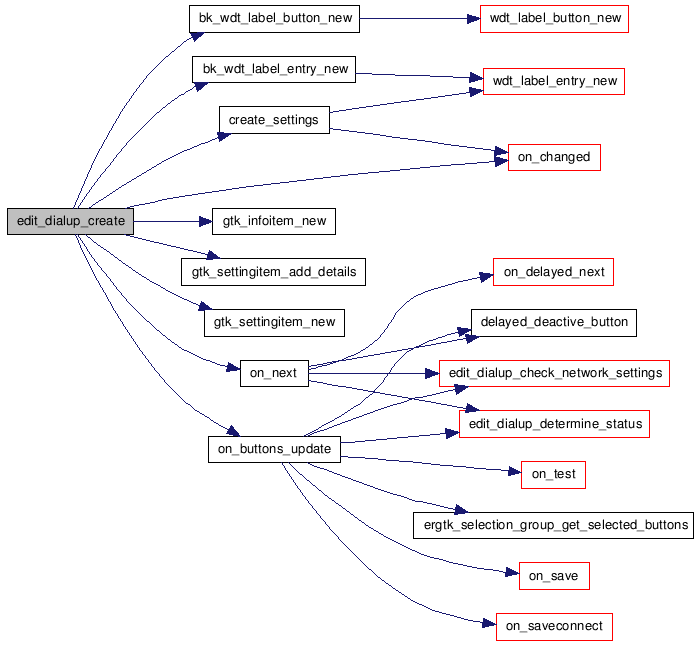
| void edit_dialup_enable_save_button | ( | gboolean | enable | ) |
Definition at line 266 of file editScreenDialup.c.
00267 { 00268 GtkWidget *widget; 00269 00270 CN_LOGPRINTF("entry %d", enable); 00271 00272 if (g_buttons) 00273 { 00274 widget = GTK_WIDGET(g_buttons->details->buttonList[1]); 00275 gtk_widget_set_sensitive(widget, enable); 00276 } 00277 }
| void edit_dialup_get_network_settings | ( | regNetworkProfile_t * | settings | ) |
Definition at line 576 of file editScreenDialup.c.
00577 { 00578 regDialupSetting_t *dialupSettings; 00579 const gchar *phone, *user, *password, *profilename; 00580 00581 CN_LOGPRINTF("entry [%p]", settings); 00582 00583 g_return_if_fail(settings != NULL); 00584 g_return_if_fail(settings->connection == dialup_t); 00585 00586 // free the old settings 00587 dialupSettings = settings->dialupSettings; 00588 if (dialupSettings) 00589 { 00590 g_free(dialupSettings->phone); 00591 g_free(dialupSettings->user); 00592 g_free(dialupSettings->password); 00593 g_free(dialupSettings); 00594 dialupSettings = NULL; 00595 settings->dialupSettings = NULL; 00596 } 00597 00598 // store the new settings 00599 if (settings->connection == dialup_t) 00600 { 00601 profilename = edit_dialup_get_profilename(); 00602 g_free(settings->name); 00603 settings->name = g_strdup(profilename); 00604 00605 dialupSettings = g_new0(regDialupSetting_t, 1); 00606 if (dialupSettings) 00607 { 00608 phone = edit_dialup_get_phone(); 00609 user = edit_dialup_get_user(); 00610 password = edit_dialup_get_password(); 00611 00612 dialupSettings->phone = g_strdup(phone); 00613 dialupSettings->user = g_strdup(user); 00614 dialupSettings->password = g_strdup(password); 00615 00616 settings->dialupSettings = dialupSettings; 00617 } 00618 } 00619 }
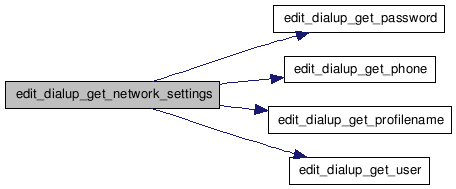
| const char* edit_dialup_get_profilename | ( | void | ) |
Definition at line 666 of file editScreenDialup.c.
00667 { 00668 GtkWidget *widget; 00669 const char *profilename = NULL; 00670 00671 if (g_profilename) 00672 { 00673 widget = g_profilename->details->entry; 00674 profilename = gtk_entry_get_text(GTK_ENTRY(widget)); 00675 } 00676 00677 CN_LOGPRINTF("return profilename=%s", profilename); 00678 return profilename; 00679 }
| void edit_dialup_restore_network_settings | ( | void | ) |
Definition at line 700 of file editScreenDialup.c.
00701 { 00702 char *phone = NULL; 00703 char *user = NULL; 00704 char *password = NULL; 00705 char *profilename = NULL; 00706 00707 CN_LOGPRINTF("entry"); 00708 00709 if (g_old_settings) 00710 { 00711 phone = g_old_settings->phone; 00712 user = g_old_settings->user; 00713 password = g_old_settings->password; 00714 } 00715 if (g_old_profilename) 00716 { 00717 profilename = g_old_profilename; 00718 } 00719 00720 edit_dialup_set_phone(phone); 00721 edit_dialup_set_user(user); 00722 edit_dialup_set_password(password); 00723 edit_dialup_set_profilename(profilename); 00724 00725 }
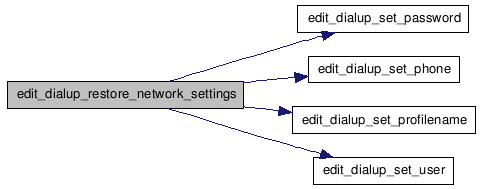
| void edit_dialup_set_network_settings | ( | const regNetworkProfile_t * | settings | ) |
Definition at line 459 of file editScreenDialup.c.
00460 { 00461 regDialupSetting_t *dialupSettings = NULL; 00462 char *phone = ""; 00463 char *user = ""; 00464 char *password = ""; 00465 char *profilename = ""; 00466 00467 CN_LOGPRINTF("entry [%p]", settings); 00468 00469 g_return_if_fail(settings != NULL); 00470 g_return_if_fail(settings->connection == dialup_t); 00471 00472 // get the values 00473 profilename = settings->name; 00474 dialupSettings = settings->dialupSettings; 00475 if (dialupSettings) 00476 { 00477 phone = dialupSettings->phone; 00478 user = dialupSettings->user; 00479 password = dialupSettings->password; 00480 } 00481 00482 // set the text for screen objects 00483 edit_dialup_set_phone(phone); 00484 edit_dialup_set_user(user); 00485 edit_dialup_set_password(password); 00486 edit_dialup_set_profilename(profilename); 00487 00488 edit_dialup_determine_status(); 00489 00490 // make a backup copy of the settings 00491 edit_dialup_backup_network_settings(); 00492 }
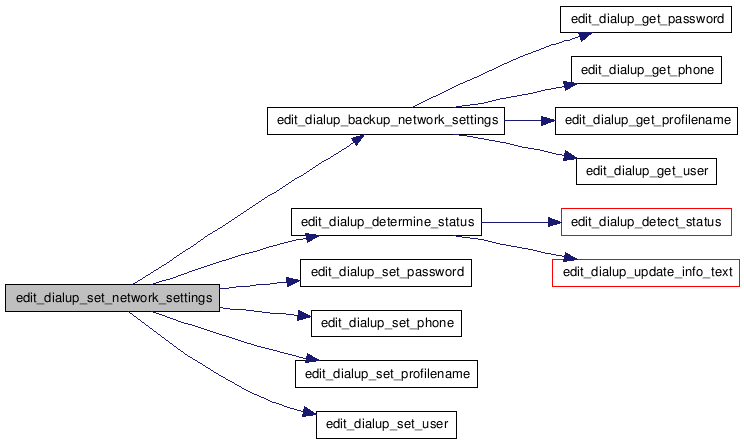
| void edit_dialup_set_profilename | ( | const char * | profilename | ) |
Definition at line 562 of file editScreenDialup.c.
00563 { 00564 GtkWidget *widget; 00565 00566 CN_LOGPRINTF("entry [%s]", profilename); 00567 00568 if (g_profilename) 00569 { 00570 widget = g_profilename->details->entry; 00571 gtk_entry_set_text(GTK_ENTRY(widget), 00572 profilename ? profilename: ""); 00573 } 00574 }
| void edit_dialup_set_text | ( | void | ) |
Definition at line 279 of file editScreenDialup.c.
00280 { 00281 GtkWidget *widget = NULL; 00282 00283 CN_LOGPRINTF("entry"); 00284 00285 if (g_dialup) 00286 { 00287 gtk_settingitem_set_header_text(GTK_SETTINGITEM(g_dialup), 00288 _("Network profile")); 00289 } 00290 00291 if (g_phone) 00292 { 00293 widget = g_phone->label; 00294 gtk_label_set_text(GTK_LABEL(widget), 00295 _("Type the phone number which you get from your ISP:")); 00296 } 00297 00298 if (g_user) 00299 { 00300 widget = g_user->label; 00301 gtk_label_set_text(GTK_LABEL(widget), _("Type your username:")); 00302 } 00303 00304 if (g_password) 00305 { 00306 widget = g_password->label; 00307 gtk_label_set_text(GTK_LABEL(widget), _("Type your password:")); 00308 } 00309 00310 if (g_profilename) 00311 { 00312 widget = g_profilename->details->label; 00313 gtk_label_set_text(GTK_LABEL(widget), 00314 _("You can personalize the profile name.")); 00315 widget = g_profilename->details->button; 00316 gtk_button_set_label(GTK_BUTTON(widget), _("Next")); 00317 } 00318 00319 if (g_buttons) 00320 { 00321 widget = g_buttons->details->label; 00322 gtk_label_set_text(GTK_LABEL(widget), 00323 _("Select an action for this profile.")); 00324 00325 widget = GTK_WIDGET(g_buttons->details->buttonList[0]); 00326 gtk_button_set_label(GTK_BUTTON(widget), _("Test")); 00327 widget = GTK_WIDGET(g_buttons->details->buttonList[1]); 00328 gtk_button_set_label(GTK_BUTTON(widget), _("Save")); 00329 widget = GTK_WIDGET(g_buttons->details->buttonList[2]); 00330 gtk_button_set_label(GTK_BUTTON(widget), _("Save & Connect")); 00331 } 00332 }

| gboolean on_edit_dialup_keypress | ( | GdkEventKey * | event | ) |
Definition at line 1046 of file editScreenDialup.c.
01047 { 01048 pingContext_t *ctxt; 01049 GtkToggleButton *button; 01050 gboolean ret = FALSE; 01051 01052 CN_LOGPRINTF("entry"); 01053 01054 ctxt = cmgr_get_ping_ctxt(); 01055 switch (event->keyval) 01056 { 01057 case GDK_Return: 01058 // 'Enter' key is pressed 01059 if (!connect_ping_in_pinging(ctxt)) 01060 { 01061 // simulate clicking the 'Save & Connect' button 01062 if (g_buttons) 01063 { 01064 button = GTK_TOGGLE_BUTTON(g_buttons->details->buttonList[2]); 01065 gtk_toggle_button_set_active(button, TRUE); 01066 } 01067 ret = TRUE; 01068 } 01069 break; 01070 01071 case GDK_F5: 01072 // 'UP' key is pressed 01073 // goto the one top level page 01074 connect_ping_abort(ctxt); 01075 cmgr_up_page(); 01076 ret = TRUE; 01077 break; 01078 case GDK_Down: 01079 case GDK_Up: 01080 // avoid the standard GTK behaviour for GtkEntries 01081 erbusy_off(); 01082 ret = TRUE; 01083 break; 01084 default: 01085 erbusy_off(); 01086 break; 01087 } 01088 01089 return ret; 01090 }
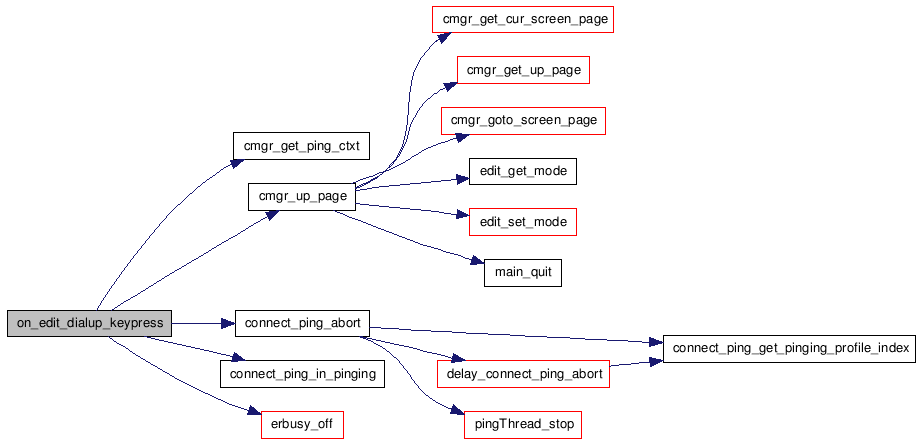
 1.5.6
1.5.6